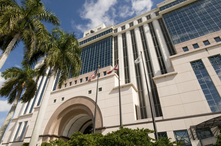Ascertainable Creditors & Untimely Creditor Claims

Who is considered to be a “reasonably ascertainable creditor” in a Florida lawsuit? Who does a personal representative in Florida need to serve a notice of creditors to? If a creditor fails to file a timely claim against a West Palm Beach or Miami estate, what happens? If you are involved in Florida litigation regarding a notice to creditors, you may want to read Cantero v. Estate of Caswell.
Ascertainable Creditors
If you are serving as the personal representative of a Florida estate, you will have to comply with Florida Statute 733.2121. Therefore, as personal representative, you must properly publish Notice to Creditors and make a diligent search to determine creditors.
Florida Statute 733.2121(3)(a) explains in more detail what the personal representative must do to ensure that he or she properly gives notice to creditors of the estate. This section states the following :
“The personal representative shall promptly make a diligent search to determine the names and addresses of creditors of the decedent who are reasonably ascertainable, even if the claims are unmatured, contingent, or unliquidated, and shall promptly serve a copy of the notice on those creditors. Impracticable and extended searches are not required. Service is not required on any creditor who has filed a claim as provided in this part, whose claim has been paid in full, or whose claim is listed in a personal representative’s timely filed proof of claim.”
Furthermore, in any trust or estate matter, it is very important to know filing deadlines. Under Florida Statute 733.702(1), creditors must file any statements of claim against a decedent’s estate within three months of the first publication of the notice to creditors or within thirty days of being served with it, whichever is later. Any claim not filed within that time is barred unless the court grants an extension.733.702(3), Florida Statutes(2012). Extensions can be granted “upon ground of fraud, estoppel, or insufficient notice of the claims period.” If the personal representative fails to provide notice to a reasonably ascertainable creditor of the estate, the creditor may be granted an extension to file his or her claim after the deadline.
Cantero v. Estate of Caswell
Florida probate litigators know that disputes regarding notice to creditors are common. For example, estate and trust attorneys encounter litigation where there parties argue whether or not an untimely creditor claim against a Florida estate should be barred. Frequently, when a creditor files a claim late, the creditor argues that an extension should be granted because he or she is a reasonably ascertainable creditor and, therefore, he or she should have been given actual notice by the personal representative.
This is exactly the argument in Cantero v. Estate of Caswell, a recent Third DCA opinion. Here, Cantero appeals the trial court’s order granting the motion to strike his claim against the Florida estate as untimely. Cantero filed his claim nearly fourth months after the expiration of the creditor claim period. He asserted that he was a reasonable ascertainable creditor entitled to personal service of Notice to Creditors and, because he did not receive personal service of it, his claim was not time-barred.
However, the trial court determined that the personal representative of the estate complied with the requirements of section 733.2121 and that Cantero’s claim was not reasonably ascertainable. Therefore, it struck the claim as untimely. The Third DCA affirmed the trial court’s decision.
If you believe you are a creditor of a Florida estate, you should consider interviewing a West Palm Beach inheritance lawyer who can advise you as to what your rights are. To interview Florida probate litigator John Pankauski, call (561)268-0233 ext.101.